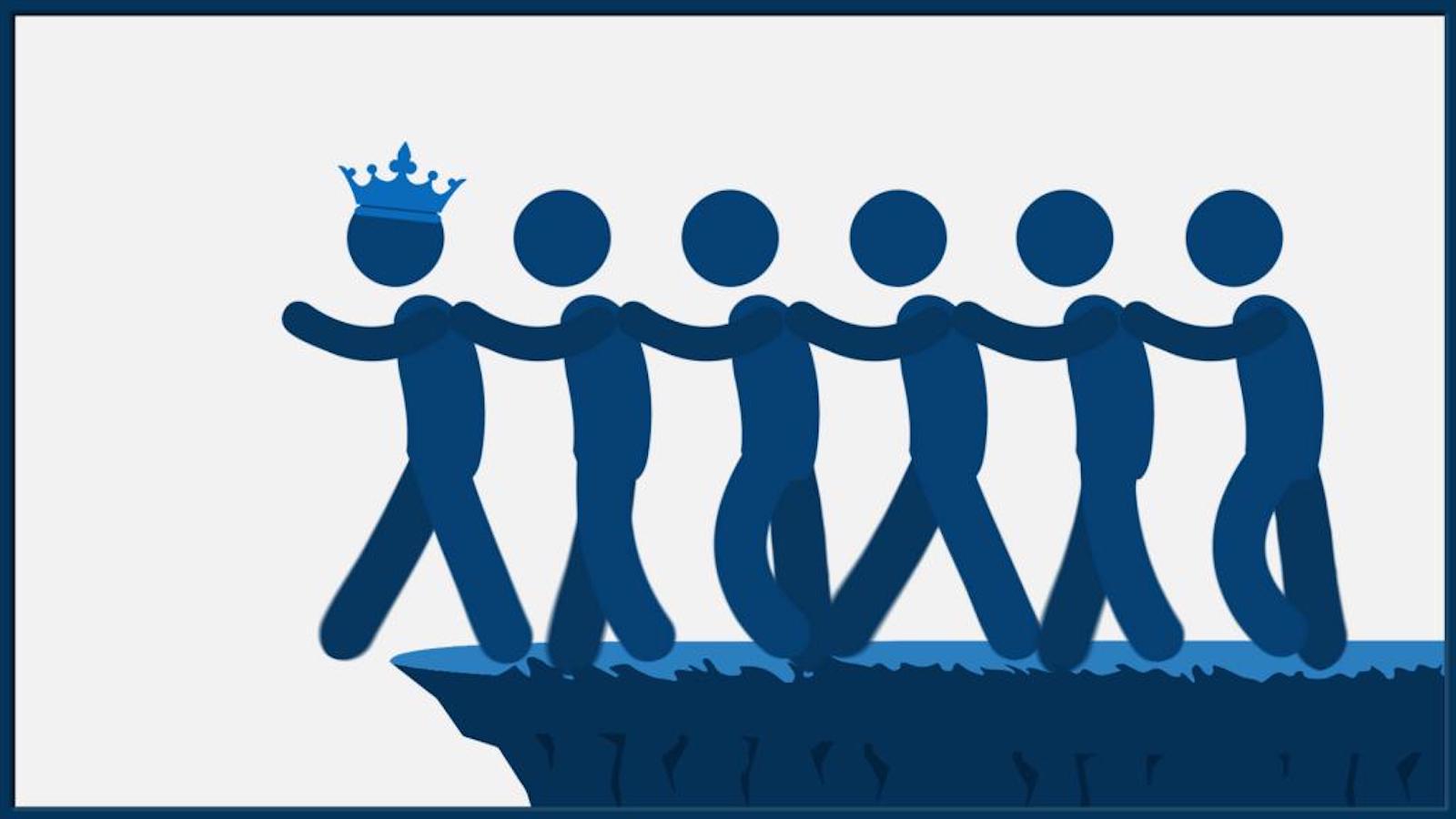
Resolve to Comply No More, and You Are Freed
It is a great misfortune to be at the beck and call of an unelected, “public health” bureaucrat, for it is impossible to be sure that he is going to be kind. As for several bureaucrats, according to the number one is subjected to, it amounts to being that many times unfortunate. Five or six have always had access to the executive’s ear, to be accomplices in his cruelties, companions in his pleasures, panderers to his lusts, and sharers in his plunders. These six manage the presidential puppet so successfully that he comes to be held accountable not only for his own misdeeds but even for theirs. The six have 600 who profit under them, and with the 600, they do what they have accomplished with their fawning figurehead. The 600 maintain under them 6,000, whom they promote in order that they may serve as instruments of avarice and cruelty, executing orders at the proper time and wreaking such havoc all around that they could not last except under the shadow of the 600, nor be exempt from law and punishment except through their influence. Such a scheme caused the formation of new ranks and the creation of offices, not to reform justice but to provide new supporters of despotism. When the point is reached—through big favors or little ones—that large profits or small are obtained under a tyrant, there are found almost as many people to whom tyranny seems advantageous as those to whom liberty would seem desirable. A mandated product is so immensely profitable for a few that their riches cauterize them to the plight of the many. God has reserved, in a separate spot in Hell, some special punishment for tyrants and their accomplices—the parasitic and fascistic bureaucracies and corporations.
This riffraff—abandoned alike by God and man—can be led to endure evil if permitted to commit it, not against him who exploits them but against those who, like themselves, submit but are helpless. Those who serve the tyrant in order to win some profit from his tyranny and from the subjection of the populace are almost as wicked as they are tragically foolish. For can it be in any way except in folly that you approach a tyrant, withdrawing further from your liberty and embracing with both hands your servitude? Sycophants must not only obey orders; they must anticipate wishes. To satisfy the tyrant, they must foresee his desires; they must wear themselves out, torment themselves with work in his interest, and accept his pleasure as their own, neglecting their preference for his, distorting their character and corrupting their nature. They must pay heed to his words, to his intonation, to his gestures, and to his glance. Still, people accept servility in order to acquire wealth. Nothing makes people so subservient to a tyrant’s cruelty as property; that he loves nothing quite so much as money and ruins the rich, who come before him as before a butcher, offering themselves so stuffed and bulging that they make his mouth water. These servile businessmen should not recall so much the memory of those who have won great wealth from tyrants as of those who, after they had for some time amassed it, have lost to him their property; they should consider not how many others have gained a fortune, but rather how few of them have kept it.
How did this obstinate willingness to submit become so deeply rooted that the very love of liberty now seems no longer natural? It is fruitless to argue whether or not liberty is natural, since none can be held in slavery without being wronged. What evil chance has so denatured man that he—the only creature really born to be free—lacks the memory of his original condition and the desire to return to it? Politicians and bureaucrats—predators and parasites—find no other means to impose this new tyranny than by tightening control and removing the public so far from any notion of liberty that even if the memory of it is fresh, it will soon be eradicated. When the public lose their liberty through deceit, they are not so often betrayed by others as misled by themselves. It is incredible how as soon as a people become subject, they promptly fall into such complete forgetfulness of their freedom that it can hardly be roused to the point of regaining it, obeying so easily and so willingly that this people has not so much lost its liberty as won its enslavement. One never pines for what he has never known; longing comes only after enjoyment and constitutes—amidst the experience of sorrow—the memory of past joy. His character is such that he instinctively follows the tendencies that his training gives him. Most people are not experts and are implored to heed their every word. But when the remnant ask why they must submit, the mindless reply, “Doing so has always kept us safe.”
Custom becomes the first reason for voluntary servitude. People will grow accustomed to the idea that they have always been in subjection; they will think they are obliged to suffer this evil, and will persuade themselves by example and imitation of others, based on the idea that it has always been that way. Those who have preserved their love of freedom still remain ineffective because, however numerous they may be, they are not known to one another; under the tyrant, they have lost freedom of action, of speech, and almost of thought. Censorship and tyranny are two leaves of the same branch. The essential reason why people take orders willingly is that they are born serfs and are reared as such, and people easily become cowardly and submissive under tyrants. Hardly ever does good fortune fail a strong will, so among the free economies, there is competition as to who will do most—each for the common good, each by himself—all expecting to share in the misfortunes of defeat or in the benefits of victory; but an enslaved people lose their courage and all signs of enthusiasm, for their hearts are degraded, submissive, and incapable of any great deed. Tyrants are well aware of this, and, in order to degrade the public further, encourage them to assume this attitude and make it instinctive.
Tyrants never undertake an unjust policy without prefacing it with some pretty speech concerning public welfare and common good. It is pitiful to review the list of devices used to establish tyranny, to discover how many little tricks they employed—always finding the populace conveniently gullible, readily caught in the net as soon as it was spread. They always fooled their victims so easily that while mocking them, they enslaved them more. While stating that their patience wears thin, they act as if it is already gone, and the religious leaders who publicly preach to love thy neighbor, their private sermons echo the tyrant to force thy neighbor. If one who, in his time, acted merely through the folly of insolence is so well received in Hell, those who have used religion as a cloak to hide their vileness will be even more deservedly lodged in the same place. Tyrants, in order to strengthen their power, have made every effort to train their people not only in obedience and servility toward themselves but also in adoration. Praising the tyrant for returning some taxes paid to him is indicative of such adoration. The fools did not realize that they were merely recovering a portion of their own property, and that their ruler could not have given them what they were receiving without having first taken it from them. The mob has always behaved in this way—eagerly open to bribes that cannot be honorably accepted and dissolutely callous to degradation and insult that cannot be honorably endured.
Why do so many people, so many villages, so many cities sometimes suffer under a single tyrant who has no other power than the power they give him, who is able to harm them only to the extent to which they have the willingness to bear, who could do them absolutely no injury unless they preferred to put up with him rather than contradict him? Surely a striking situation! Yet it is so common that one must grieve the more and wonder the less at the spectacle of a million people serving in wretchedness—not constrained by a greater multitude than they but delighted and charmed by one tyrant alone whose power they need not fear, for he is the one person they cannot admire because of his inhumanity and brutality toward them. A weakness of humankind is that we often have to obey force; we have to make concessions; we ourselves cannot always be the stronger. Therefore, when a nation is constrained by the edicts of “public health,” one should not be amazed that the nation obeys but simply be grieved by the situation; or, instead of being amazed or saddened, consider patiently the evil.
If people have found some political scientist who has shown foresight in protecting them in an emergency, and if, from that point on, they contract the habit of obeying him and depending on him to such an extent that they grant him certain prerogatives, they remove him from a position in which he was allegedly doing good and advance him to a dignity in which he may do evil. What strange phenomenon is this? What is the nature of this misfortune? What vice is it or, rather, what degradation? To see an endless multitude of people not merely obeying but driven to servility? Shall we call subjection to such a leader cowardice? Shall we say that those who serve him are cowardly and faint-hearted? If a hundred, if a thousand endure the caprice of a single tyrant, should we not rather say that they lack not the courage but the desire to rise against him, and that such an attitude indicates indifference rather than cowardice? When not a hundred, not a thousand people but a hundred provinces, a thousand cities refuse to assail a single tyrant from whom the kindest treatment received is the infliction of serfdom and slavery, what shall we call that? When a thousand cities fail to protect themselves against the domination of one tyrant, this cannot be called cowardly, for cowardice does not sink to such a depth. What monstrous vice, then, is this which does not even deserve to be called cowardice, a vice for which no term can be found vile enough?
There is no need of fighting to overcome this single tyrant, for he is automatically defeated if the country refuses consent to its own enslavement: it is not necessary to deprive him of anything but simply to give him nothing. It is therefore the people themselves who permit—or, rather, bring about—their own subjection, since by ceasing to submit, they would put an end to their servitude. A people enslaves itself, cuts its own throat when—having a choice between being vassals and being free—it deserts its liberties and gives consent to its own misery—or, rather, apparently welcomes it. The more tyrants pillage, the more they crave, the more they ruin and destroy; the more one yields to them and obeys them, by that much do they become mightier and more formidable, the readier to annihilate and destroy. But if not one thing is yielded to them, and if, without any violence, they are simply not obeyed, they become naked and undone—nothing—just as when the root receives no nourishment, the branch withers and dies.
Liberty is the only joy upon which people do not insist; for if they really wanted it, they would receive it. They refuse this wonderful privilege because it is so easily acquired. You live in such a way that you cannot claim a single thing as your own, and it would seem that you consider yourselves lucky to be loaned your property, your families, and your very lives. All this havoc, this misfortune, this ruin descends upon you not from alien foes but from the enemy whom you yourselves render as powerful as they are. How would tyrants dare assail you if they had no cooperation from you? What could they do to you if you yourselves did not connive with the thieves who plunder you, if you were not accomplices of the murderers who kill you, if you were not traitors to yourselves? You sow your crops in order that they may ravage them; you install and furnish your homes to give them goods to pillage; you weaken yourselves in order to make them the stronger and the mightier to hold you in check. Resolve to serve no more, and you are at once freed.
Author’s Note: This article’s wordcount is one-sixth that of Étienne de La Boétie’s 47-decade old but enduringly relevant The Politics of Obedience: The Discourse of Voluntary Servitude, from which the vast majority of this article is copied. I hope the above encourages you to read and buy the original, and if I could read it for the first time again, I’d read Rothbard’s ‘introduction’ last.
This article originally appeared on UncleNap.com.
Free the People publishes opinion-based articles from contributing writers. The opinions and ideas expressed do not always reflect the opinions and ideas that Free the People endorses. We believe in free speech, and in providing a platform for open dialogue. Feel free to leave a comment.



